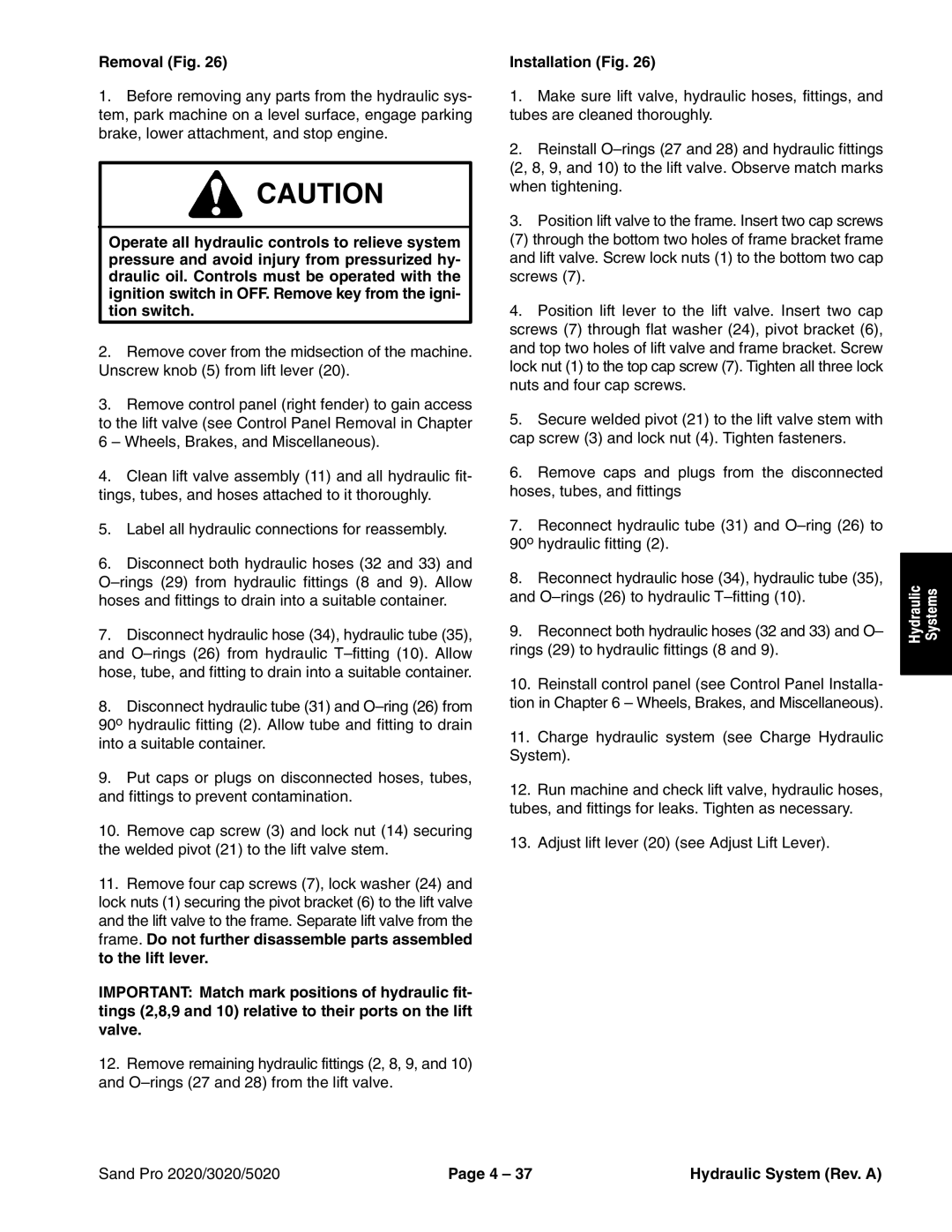
Removal (Fig. 26)
1.Before removing any parts from the hydraulic sys- tem, park machine on a level surface, engage parking brake, lower attachment, and stop engine.
![]() CAUTION
CAUTION
Operate all hydraulic controls to relieve system pressure and avoid injury from pressurized hy- draulic oil. Controls must be operated with the ignition switch in OFF. Remove key from the igni- tion switch.
2.Remove cover from the midsection of the machine. Unscrew knob (5) from lift lever (20).
3.Remove control panel (right fender) to gain access to the lift valve (see Control Panel Removal in Chapter 6 – Wheels, Brakes, and Miscellaneous).
4.Clean lift valve assembly (11) and all hydraulic fit- tings, tubes, and hoses attached to it thoroughly.
5.Label all hydraulic connections for reassembly.
6.Disconnect both hydraulic hoses (32 and 33) and
7.Disconnect hydraulic hose (34), hydraulic tube (35), and
8.Disconnect hydraulic tube (31) and
9.Put caps or plugs on disconnected hoses, tubes, and fittings to prevent contamination.
10.Remove cap screw (3) and lock nut (14) securing the welded pivot (21) to the lift valve stem.
11.Remove four cap screws (7), lock washer (24) and lock nuts (1) securing the pivot bracket (6) to the lift valve and the lift valve to the frame. Separate lift valve from the frame. Do not further disassemble parts assembled to the lift lever.
IMPORTANT: Match mark positions of hydraulic fit- tings (2,8,9 and 10) relative to their ports on the lift valve.
12.Remove remaining hydraulic fittings (2, 8, 9, and 10) and
Installation (Fig. 26)
1.Make sure lift valve, hydraulic hoses, fittings, and tubes are cleaned thoroughly.
2.Reinstall
3.Position lift valve to the frame. Insert two cap screws
(7) through the bottom two holes of frame bracket frame and lift valve. Screw lock nuts (1) to the bottom two cap screws (7).
4.Position lift lever to the lift valve. Insert two cap screws (7) through flat washer (24), pivot bracket (6), and top two holes of lift valve and frame bracket. Screw lock nut (1) to the top cap screw (7). Tighten all three lock nuts and four cap screws.
5.Secure welded pivot (21) to the lift valve stem with cap screw (3) and lock nut (4). Tighten fasteners.
6.Remove caps and plugs from the disconnected hoses, tubes, and fittings
7.Reconnect hydraulic tube (31) and
8.Reconnect hydraulic hose (34), hydraulic tube (35), and
9.Reconnect both hydraulic hoses (32 and 33) and O– rings (29) to hydraulic fittings (8 and 9).
10.Reinstall control panel (see Control Panel Installa- tion in Chapter 6 – Wheels, Brakes, and Miscellaneous).
11.Charge hydraulic system (see Charge Hydraulic System).
12.Run machine and check lift valve, hydraulic hoses, tubes, and fittings for leaks. Tighten as necessary.
13.Adjust lift lever (20) (see Adjust Lift Lever).
Hydraulic | Systems |
|
|
Sand Pro 2020/3020/5020 | Page 4 – 37 | Hydraulic System (Rev. A) |
